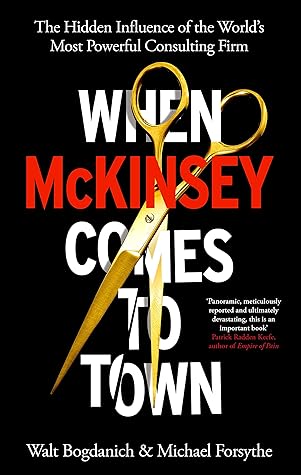More on this book
Community
Kindle Notes & Highlights
Read between
January 27 - June 26, 2024
“I am concerned that McKinsey’s report on public perception may have been weaponized by the Saudi government to crush criticism of the Kingdom’s policies, regardless of McKinsey’s intended purpose for the information,”
in recent years, Britain’s leaders have enacted major changes to the NHS, channeling a small but increasing share of the country’s health-care spending to the private sector and opening the door for American companies to enter the market. McKinsey played an outsized role in shaping and implementing these changes. Two of its biggest American clients benefited from them. The story of how the firm took center stage in overhauling the NHS says as much about the U.K. as it does about the firm. For in Britain, McKinsey had found a perfect host.
McKinsey even helped with the nationalization of British Steel (and with its subsequent privatization years later).
McKinsey was everywhere and people noticed. “If God were to remake the world, he would call upon McKinsey for assistance,” wrote the London correspondent for the journal Science.
definition: “McKinsey: n & v.t. 1. To shake up, reorganise, declare redundant, abolish committee rule. Mainly applied to large industrial companies but also applicable to any organisation with management problems.”
“when everyone is responsible, no one is responsible.”19
he warned his superiors, in classic British understatement, that the track’s condition was “heading towards the boundary of acceptability,” adding that the “balance between commercial drivers and safety are currently overwhelmingly towards the commercial.”
McKinsey also amplified the conceit that Britain, with one of the world’s most cost-effective health-care systems, still needed to cut its health budget. “The current system will no longer be affordable soon—real transformational change is needed rapidly,” it said. The reality was that the Conservative government had chosen a path of fiscal austerity amid an economic downturn, a decision that ran counter to the writings of Britain’s own John Maynard Keynes. And with the NHS in its sights, one group critical of the Conservative agenda said, “Those who maintain that we cannot afford the NHS must
...more
Adam Smith: “The wise and virtuous man is at all times willing that his own private interest should be sacrificed to the public interest.”
McKinsey was being asked to help sort out roughly the same problem the NHS faced when it first brought in the firm nearly half a century earlier and to reverse many of the provisions of the 2012 law that it had helped to craft.
The COVID-19 epidemic provided a major test of the country’s retooled health-care system. Prime Minister Boris Johnson entrusted the all-important test-and-trace effort to the former McKinsey consultant Dido Harding, now Baroness Harding. She and the country’s top health officials turned to private companies, not the NHS, to run the program. McKinsey alone charged £563,400 to provide a “vision, purpose and narrative”64 of the Harding-led program.
One former McKinsey consultant wrote anonymously, “To those convinced that a secretive cabal controls the world, the usual suspects are Illuminati, Lizard People, or ‘globalists.’ They are wrong, naturally. There is no secret society shaping every major decision and determining the direction of human history. There is, however, McKinsey & Company.” The consultant used humor to make a point, a serious point: McKinsey has an unseen presence at the table inside the world’s most consequential companies and governments.
McKinsey’s laissez-faire style of management has allowed its consultants to reap big paydays promoting addictive products, recommending policies that expand income inequality, and serving bad actors on the international stage, including major polluters. There is no questioning McKinsey’s desire to do good, to give back. But, as one former consultant said, McKinsey should also find a way to do less harm.


